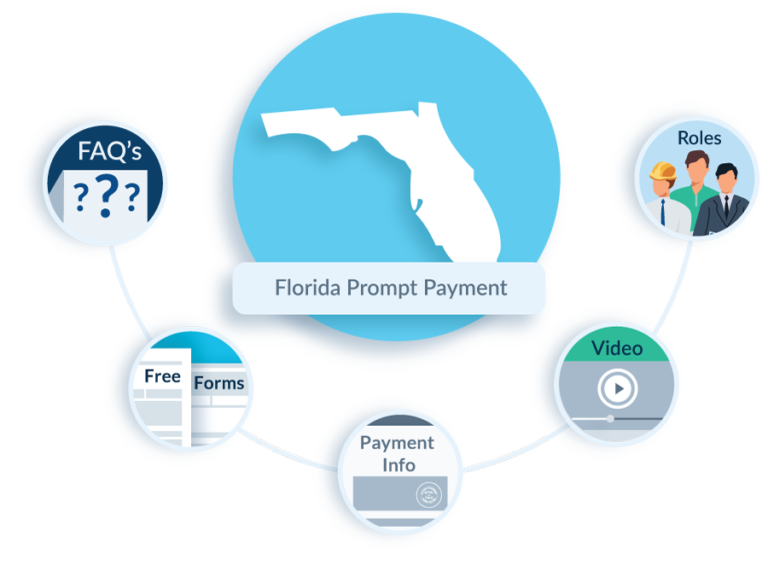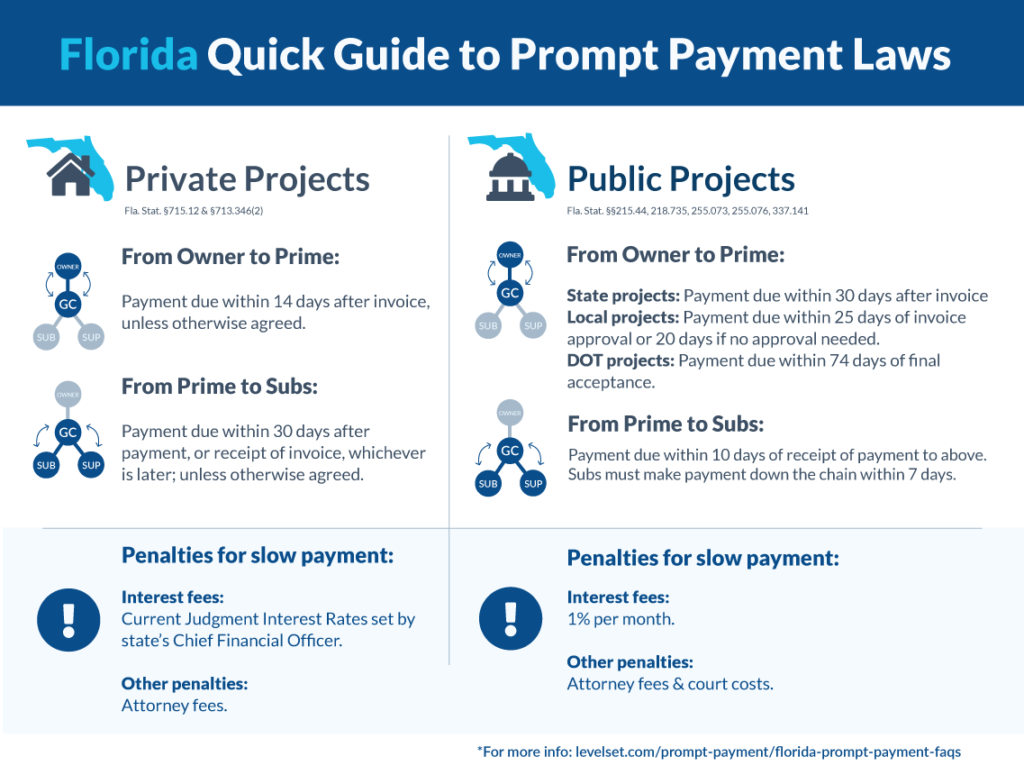(1) The due date for payment for the purchase of construction services by a local governmental entity is determined as follows:
(a) If an agent must approve the payment request or invoice before the payment request or invoice is submitted to the local governmental entity, payment is due 25 business days after the date on which the payment request or invoice is stamped as received as provided in s. 218.74(1). The contractor may send the local government an overdue notice. If the payment request or invoice is not rejected within 4 business days after delivery of the overdue notice, the payment request or invoice shall be deemed accepted, except for any portion of the payment request or invoice that is fraudulent or misleading.
(b) If an agent need not approve the payment request or invoice submitted by the contractor, payment is due 20 business days after the date on which the payment request or invoice is stamped as received as provided in s. 218.74(1).
A local governmental entity shall identify the agent or employee of the local governmental entity, or the facility or office, to which the contractor may submit its payment request or invoice. This requirement shall be included in the contract between the local governmental entity and contractor, or shall be provided by the local governmental entity through a separate written notice, as required under the contract, no later than 10 days after the contract award or notice to proceed. A contractor’s submission of a payment request or invoice to the identified agent, employee, facility, or office of the local governmental entity shall be stamped as received as provided in s. 218.74(1) and shall commence the time periods for payment or rejection of a payment request or invoice as provided in this subsection and subsection (2).
(2) If a payment request or invoice does not meet the contract requirements, the local governmental entity must reject the payment request or invoice within 20 business days after the date on which the payment request or invoice is stamped as received as provided in s. 218.74(1). The rejection must be written and must specify the deficiency and the action necessary to make the payment request or invoice proper.
(3) If a payment request or an invoice is rejected under subsection (2) and the contractor submits a payment request or invoice that corrects the deficiency, the corrected payment request or invoice must be paid or rejected on the later of:
(a) Ten business days after the date the corrected payment request or invoice is stamped as received as provided in s. 218.74(1); or
(b) If the local governmental entity is required by ordinance, charter, or other law to approve or reject the corrected payment request or invoice, the first business day after the next regularly scheduled meeting of the local governmental entity held after the corrected payment request or invoice is stamped as received as provided in s. 218.74(1).
(4) If a dispute between the local governmental entity and the contractor cannot be resolved by the procedure in subsection (3), the dispute must be resolved in accordance with the dispute resolution procedure prescribed in the construction contract or in any applicable ordinance, which shall be referenced in the contract. In the absence of a prescribed procedure, the dispute must be resolved by the procedure specified in s. 218.76(2).
(5) If a local governmental entity disputes a portion of a payment request or an invoice, the undisputed portion shall be paid timely, in accordance with subsection (1).
(6) If a contractor receives payment from a local governmental entity for labor, services, or materials furnished by subcontractors and suppliers hired by the contractor, the contractor must remit payment due to those subcontractors and suppliers within 10 days after the contractor’s receipt of payment. If a subcontractor receives payment from a contractor for labor, services, or materials furnished by subcontractors and suppliers hired by the subcontractor, the subcontractor must remit payment due to those subcontractors and suppliers within 7 days after the subcontractor’s receipt of payment. This subsection does not prohibit a contractor or subcontractor from disputing, pursuant to the terms of the relevant contract, all or any portion of a payment alleged to be due to another party if the contractor or subcontractor notifies the party whose payment is disputed, in writing, of the amount in dispute and the actions required to cure the dispute. The contractor or subcontractor must pay all undisputed amounts due within the time limits imposed by this section.
(7) Each contract for construction services between a local governmental entity and a contractor must provide for the development of a single list of items and the estimated cost to complete each item on the list required to render complete, satisfactory, and acceptable the construction services purchased by the local governmental entity.
(a) The contract must specify the process for developing the list and for determining the cost to complete each item on the list, and should include the responsibilities of the local governmental entity and the contractor in developing and reviewing the list and a reasonable time for developing the list:
1. For construction projects having an estimated cost of less than $10 million, within 30 calendar days after reaching substantial completion of the construction services purchased as defined in the contract, or, if not defined in the contract, upon reaching beneficial occupancy or use; or
2. For construction projects having an estimated cost of $10 million or more, within 30 calendar days, or, if extended by contract, up to 45 calendar days after reaching substantial completion of the construction services purchased as defined in the contract, or, if not defined in the contract, upon reaching beneficial occupancy or use.
The contract must also specify a date for the delivery of the list of items, not to exceed 5 days after the list of items has been developed and reviewed in accordance with the time periods set forth in subparagraphs 1. and 2.
(b) If the contract between the local governmental entity and the contractor relates to the purchase of construction services on more than one building or structure, or involves a multiphased project, the contract must provide for the development of a list of items required to render complete, satisfactory, and acceptable all the construction services purchased pursuant to the contract for each building, structure, or phase of the project within the time limitations provided in paragraph (a).
(c) The final contract completion date must be at least 30 days after the delivery of the list of items. If the list is not provided to the contractor by the agreed upon date for delivery of the list, the contract time for completion must be extended by the number of days the local governmental entity exceeded the delivery date. Damages may not be assessed against a contractor for failing to complete a project within the time required by the contract, unless the contractor failed to complete the project within the contract period as extended under this paragraph.
(d) The failure to include any corrective work or pending items not yet completed on the list does not alter the responsibility of the contractor to complete all the construction services purchased pursuant to the contract.
(e) Within 20 business days after the list is created, the local governmental entity must pay the contractor the remaining contract balance that includes all retainage previously withheld by the local governmental entity less an amount equal to 150 percent of the estimated cost to complete the items on the list.
(f) Upon completion of all items on the list, the contractor may submit a payment request for the amount withheld by the local governmental entity pursuant to paragraph (e) . If a good faith dispute exists as to whether one or more items identified on the list have been completed pursuant to the contract, the local governmental entity may continue to withhold up to 150 percent of the total costs to complete such items.
(g) All items that require correction under the contract which are identified after the preparation and delivery of the list remain the obligation of the contractor as defined by the contract.
(h) Warranty items or items not included in the list of items required under paragraph (a) may not affect the final payment of retainage as provided in paragraph (e) or as provided in the contract between the contractor and its subcontractors and suppliers.
(i) Retainage may not be held by a local governmental entity or a contractor to secure payment of insurance premiums under a consolidated insurance program or series of insurance policies issued to a local governmental entity or a contractor for a project or group of projects, and the final payment of retainage as provided in this section may not be delayed pending a final audit by the local governmental entity’s or contractor’s insurance provider.
(j) If a local governmental entity fails to comply with its responsibilities to develop the list required under paragraph (a) or paragraph (b) within the time limitations provided in paragraph (a), the contractor may submit a payment request to the local governmental entity for the remaining balance of the contract, including all remaining retainage withheld by the local governmental entity. The local governmental entity must pay the contractor within 20 business days after receipt of a proper invoice or payment request. If the local governmental entity has provided written notice to the contractor specifying the failure of the contractor to meet contract requirements in the development of the list of items to be completed, the local governmental entity must pay the contractor the remaining balance of the contract, less an amount equal to 150 percent of the estimated cost to complete the items that the local governmental entity intended to include on the list .
(8)
(a) With regard to any contract for construction services, a local governmental entity may withhold from each progress payment made to the contractor an amount not exceeding 5 percent of the payment as retainage.
(b) This section does not prohibit a local governmental entity from withholding retainage at a rate less than 5 percent of each progress payment, from incrementally reducing the rate of retainage pursuant to a schedule provided for in the contract, or from releasing at any point all or a portion of any retainage withheld by the local governmental entity which is attributable to the labor, services, or materials supplied by the contractor or by one or more subcontractors or suppliers. If a local governmental entity makes any payment of retainage to the contractor which is attributable to the labor, services, or materials supplied by one or more subcontractors or suppliers, the contractor must timely remit payment of such retainage to those subcontractors and suppliers.
(c) This section does not require the local governmental entity to pay or release any amounts that are the subject of a good faith dispute made in writing pursuant to the contract or the subject of a claim brought pursuant to s. 255.05 .
(d) The time limitations set forth in this section for payment of payment requests apply to any payment request for retainage made pursuant to this section.
(e) Paragraph (a) does not apply to construction services purchased by a local governmental entity which are paid for, in whole or in part, with federal funds and are subject to federal grantor laws and regulations or requirements that are contrary to any provision of the Local Government Prompt Payment Act.
(f) This subsection does not apply to any construction services purchased by a local governmental entity if the total cost of the construction services purchased as identified in the contract is $200,000 or less.
(9) All payments due under this section and not made within the time periods specified by this section shall bear interest at the rate of 2 percent per month, or the rate specified by contract, whichever is greater.

